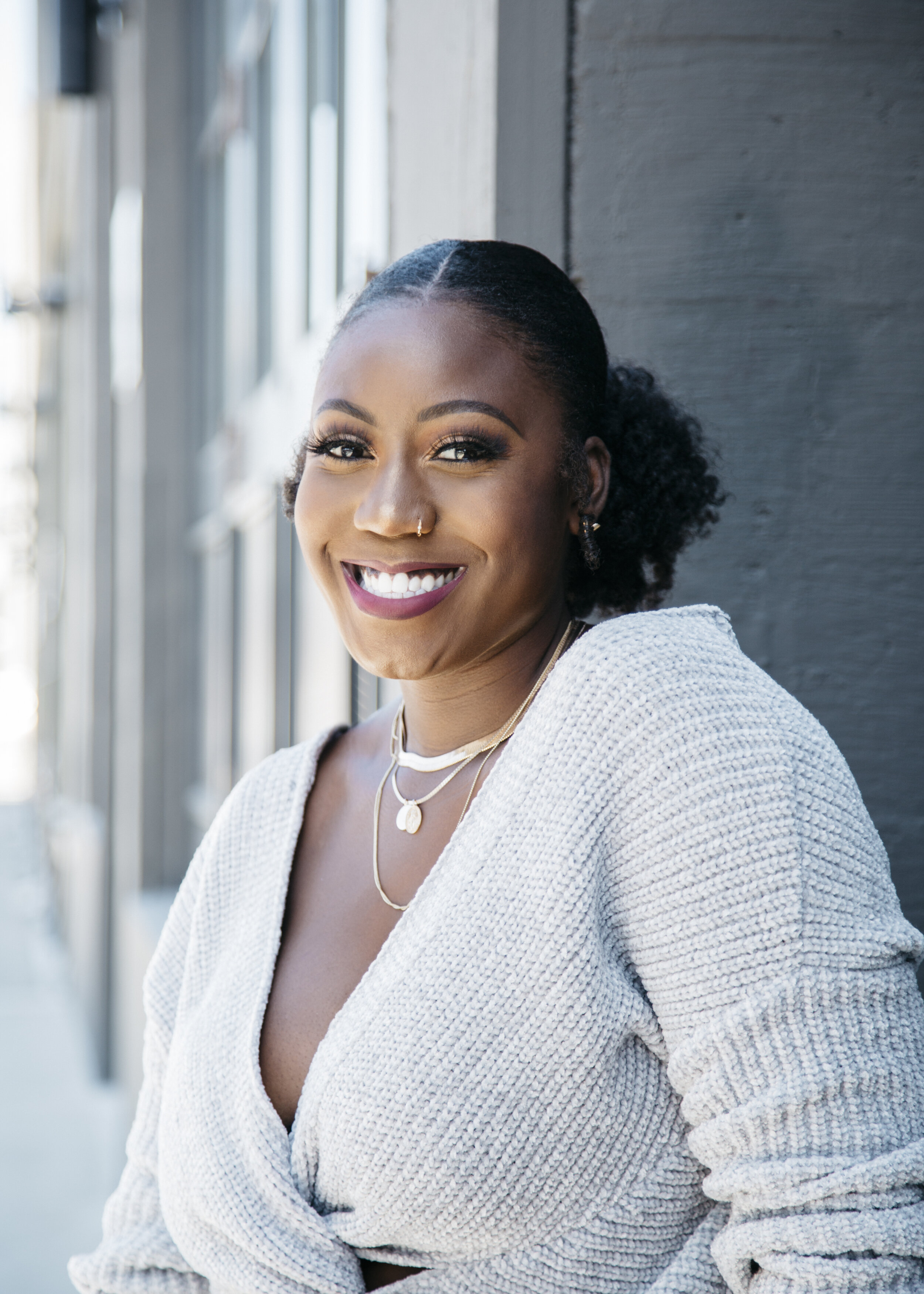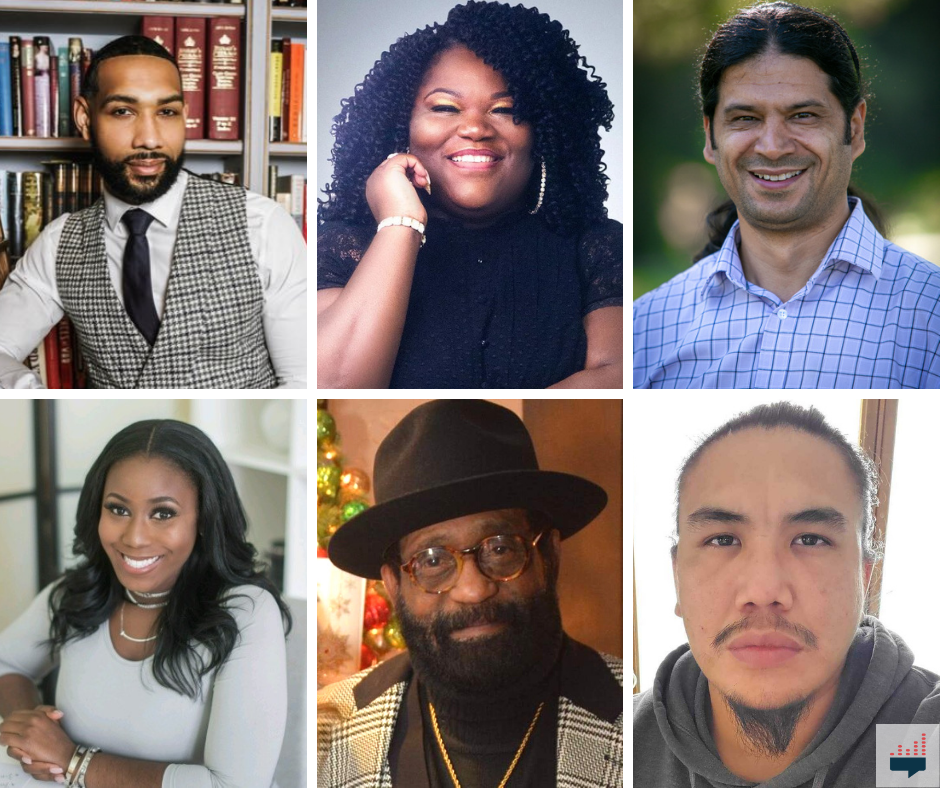
Submitted photo
When you hear the words “American Dream,” what comes to mind?
For Dyjuan Tatro, a formerly incarcerated felon, it’s about being able to vote for your country’s future.
For Mahmoud Salimi, an Afghan immigrant, it looks different when you’re outside the United States than when you’re inside it.
For Sam Johns, an Alaskan native, it means navigating between two worlds — the English-speaking and the indigenous.
For Keisha Credit, a Black entrepreneur in Seattle, it is a concept that belongs to White America.
All four are guests on the second episode of our national talk show, “America Amplified: Election 2020.”
Hosts Rose Scott of WABE in Atlanta and Kavitha George of Alaska Public Media lead the guests on a conversation about the American Dream and what is at stake in November’s election.
This show explores where our definitions of the American Dream come from and what it means to achieve it.
Audio postcard: Teens and the American Dream
The show opens with thoughts from teens across the country. In an audio postcard produced by Mayowa Aina, five teenagers share their perspectives on the American Dream.
Though they live far apart, they seem to equally struggle with the concept’s positive and negative aspects, especially as it applies to immigrants.
As Nancy Bowne, 19, of New Jersey says: “It sounds like a legend, some type of sparkling vision that is seen as achieving the likes of nirvana. It’s a state of mind.”
The other teens featured are: Gabe Rambayon, 17, of Washington State; Sycely Wheeles, 15, of Alaska; Daisy Carter, 19, of Alaska; and Marian Mohamed, 18, of Washington State.
Talk show listening sessions
As part of our talk show run, we will be holding two listening sessions: On October 27, the Tuesday before election day, and November 10, the Tuesday after.
Each 90-minute session starts at 7 p.m. ET/6 p.m. CT/4 p.m. PT.
Space is limited. Register today!
From felon to college graduate
Dyjuan Tatro served 12 years in prison and during the last four, he took a full course load through Bard College. He was released in August 2017 and less than a year later, he graduated with a bachelor’s degree in mathematics.
He’s now the government affairs officer for the Bard Prison Initiative, which brings the Bard College curriculum to six New York state prisons.
“I was interested in politics, I finished my degree, got a job and paid my taxes. But I couldn’t vote,” Tatro recalls.
Then in 2018, an executive order restored the right to vote for New Yorkers on parole.
“I went from not being able to vote to being able to vote overnight,” Tatro says. “From that moment on, especially someone being interested in political space, I made it my responsibility to know the candidates, know the issues and to go out and vote.”
In the process, he also became more conscious of the millions across the country who are felony disenfranchised and locked out of the system.
“On the one hand I’m living an aspect of the American Dream but at the same time, I have to realize that I’m an exception, I’m not the rule,” Tatro shares. “How do we expand this dream to more people? … If we reserve this for the few then it becomes, like many other things in America, you get this unequal distribution.”
Our imperfect nation
Mahmoud Salimi, who teaches filmmaking at California Lutheran University, and Cecilia Johnson, founder of The Right Direction in Kansas City, Missouri, talk about America as a place to create new opportunities, but also as an imperfect union.
Both Salimi and Johnson mention being shocked by the prevalence of homelessness in their cities.

Submitted photo

Submitted photo
“When you are outside of the United States, [it] looks like an ideal place, a dream that you want to come true. It’s utopia,” says Salimi, who participated in an America Amplified National Listening Session. “But once you come to the United States, you see a different side of it. You see there are people that are just like you … the challenges you face they are facing too. It’s not that flashy, beautiful image that you get.”
Johnson says she didn’t see homeless people until she was 10, when she moved to Kansas City from a small town in southeast Arkansas. She says she learned about the American Dream in middle school, and found it fascinating.
“It allowed me to think about freedoms and opportunities that America does provide its citizens that you can’t find in most other nations across the world. And how I benefited from that and grown to take advantage of those opportunities.”
They also agree that America isn’t perfect.
“I don’t think any nation is perfect,” Salimi says. “America has had two sides of presenting itself … one is outside, to bring democracy. And inside, it’s struggling with race, gun problems and health care problems and so many other challenges. It’s unfortunate you don’t see the real picture of United States when you’re outside the United States.”
Johnson says: “There are still times today where things are not perfect. It’s easy to nitpick everything that happens whenever we fall, whenever we stumble, whenever we have something that seems unjust.”
The important thing is to remember the differences that exist, she says.
“We should aspire to be inclusive and be inspired to keep our arms open to other people, which we have,” Johnson says. “We have to keep in mind that equal opportunity does not mean equal outcome.”
The American Dream and family legacy

Submitted photo
Your culture also plays a huge impact on what the American Dream means.
Samuel Johns, an Ahtna Athabascan activist in Alaska, says he learned the American Dream as a patriarchal, capitalist and winner-takes-all mindset. And that’s in direct opposition to what he learned as an indigenous person.
“But as I got older my traditional values started teaching me that being number one doesn’t even matter,” Johns says. “What does matter is who is that leader that’s willing to let everyone go ahead of them and makes sure everyone crosses that line safely. … The American Dream became more of a personal thing, where I want to help my people rather than be a millionaire.”
Willard Tillman of Oklahoma is the former executive director of Oklahoma Black Historical Research Project Inc. He is an advocate for Black farmers who want to hold onto their family’s land and legacy.

“My challenge is to get people to understand agriculture is the second largest employer in the world,” Tillman says. “And to get most of the young youth involved in farming activities. Land – they’re not making any more of it and that’s a precious tool. That’s one I’d like to see stay in the hands of black farmers.”
Johns’ story about his family’s legacy revolves around the Alyeska Pipeline. The 1970s project was pitched as a step toward the American Dream as it would bring jobs and money. He says his father’s generation was never taught how to manage that wealth and as a result, many people died from alcoholism and other illnesses.
“There was no American Dream, it was an American nightmare,” Johns says. “It’s still something my dad is trying to heal from today. The pipeline is still there. But the jobs aren’t. The American Dream isn’t.”

Submitted photo
Keisha Credit bought her first house when she was 21. She sold it to move in with her grandfather to help take care of him, and then inherited his house when he died.
For this entrepreneur and business coach in Seattle, she is not working toward the American Dream as much as working for something personal.
“When I envision the term American Dream,“ Credit says, “I do picture a white family. I don’t even see myself when it comes to that terminology.”
While she understands the concept and has always known the importance of owning property, her mission is to be an example for others.
“This is my dream, this doesn’t have to be your dream as well,” Credit says. “For my family, it’s preserving our legacy, growing the family, doing the best we can, and to continue to put great things into the world.”
Audio Diary: A shrinking Colorado town with a big heart

Photo from Wikimedia
For many, the American Dream is epitomized in small town America. Walden, Colorado, is a town with one doctor and a part-time mental health worker.
And it is a town that has fallen on hard times after traditional industries died. The pandemic has added to the challenges.
Walden is Wyoming Public Media reporter Melodie Edwards’ hometown. She produces a podcast called “Modern West” that is exploring the viability and resiliency of small towns in the west that are being drained of population as young people move away.
Suze Kanack, a community organizer, says Walden is “rich in heart.”
“When my mother died, she asked me to take care of two things: my father and my community. My father was a quadrapalegic. He was less hard to take care of,” Suze says with a laugh.
Some wonder if the pandemic will be a blessing in disguise, revitalizing the town with people looking for a simpler way of life — and a new place to call home.

Show credits
Executive directors: Donna Vestal and Alisa Barba
Senior producer and director: Andrea Tudhope
Operations manager: Jennifer Tufts
Assistant producers: Mayowa Aina, Alaska Public Media; Grace Walker of WABE
Community engagement directors: Ann Alquist and Matthew Long-Middleton
Digital and social media editor: Kathy Lu
Advisory committee: Ron Jones, program director, KCUR; Abby Goldstein, PRPD president; Rick Holter, VP of news, KERA; Stephen Becker, senior producer, KERA; Art Hughes, executive producer, Koahnic Broadcast Corp.; Monica Braine, senior producer, Native America Calling; Ernesto Aguilar, program director, National Federation of Community Broadcasters; John Haas, director of radio and television at Public Broadcasting Atlanta (WABE); Breeze Richardson, formerly WBEZ-Chicago, now communication director at Kemper Museum of Contemporary Art; Brian Bull, reporter, KLCC
Technical support: Chris Prewitt of KCUR in Kansas City
Distribution support: Native Voice One




